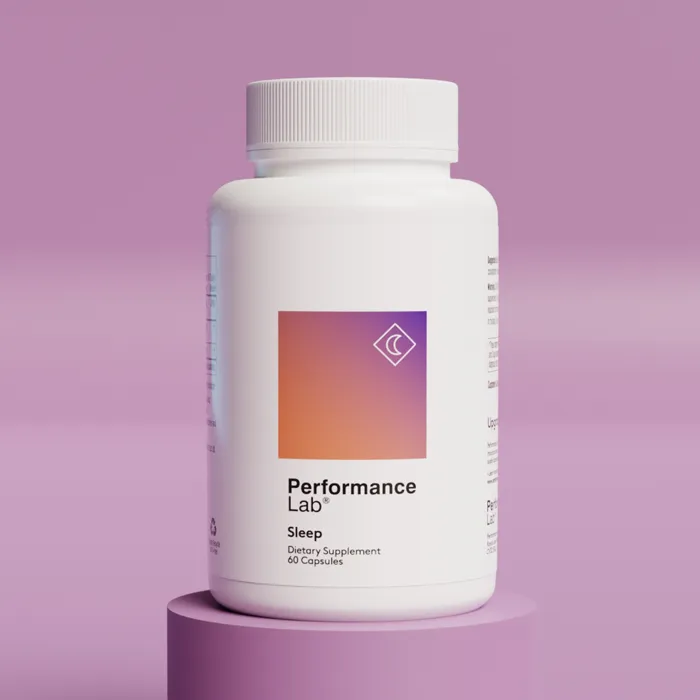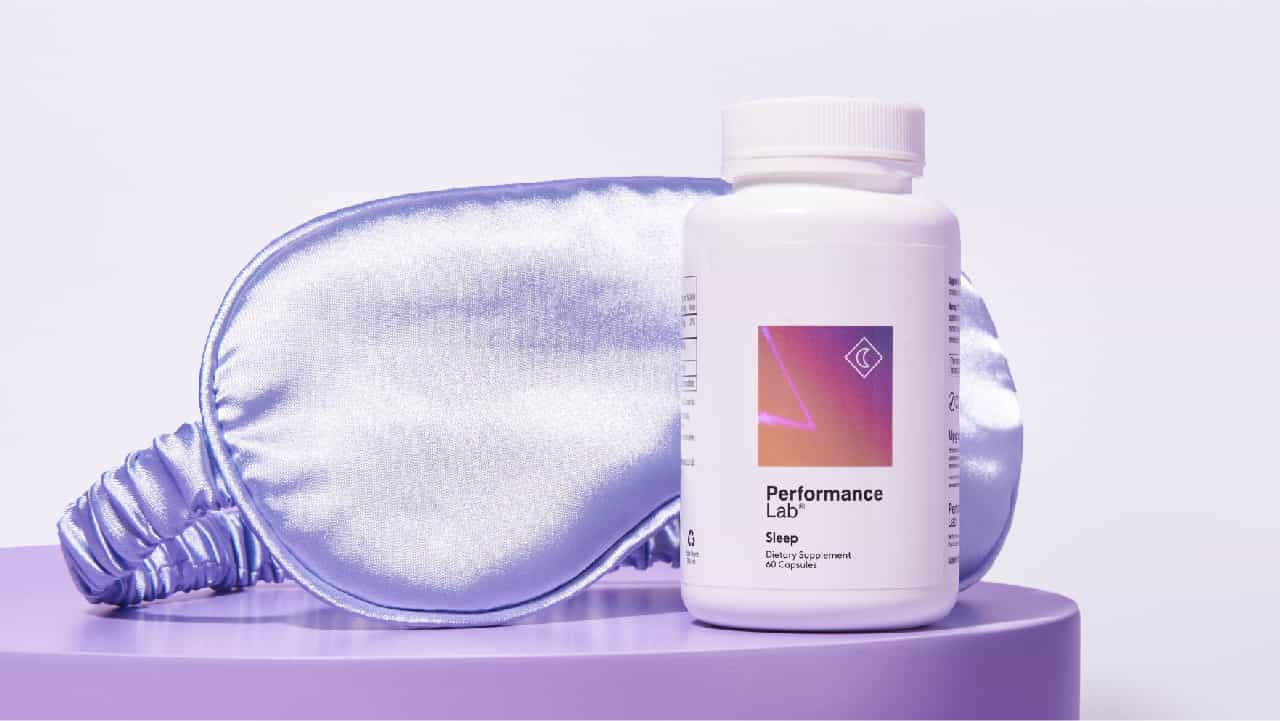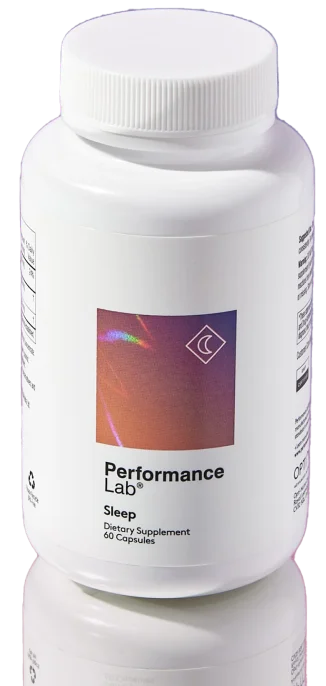Having trouble falling asleep? Sleep problems may indicate deeper troubles with your nutrient status.
It's estimated that just under a third of Americans fail to get enough sleep - in other words, they are sleep deprived.
Up to 70 million of us have sleep disorders that interfere with our sleep, whether it's problems falling asleep such as insomnia, staying asleep, or fighting excessive daytime sleepiness. One in five of us report feeling sleepy during the day.
Long term sleep deprivation can cause physical and mental health problems, and can even take years off our lives. And did you know that our diet could be a contributing factor? (1)
Key Takeaways
- Chronic insomnia and sleep deprivation are common, and they often tie back to deeper issues such as stress, lifestyle, and poor nutrient status.
- Vitamins and minerals act as cofactors in hundreds of pathways that regulate sleep, relaxation, and recovery, so deficiencies can make it harder to fall asleep and stay asleep.
- Good sleep hygiene plus a nutrient dense diet should be the foundation, but a high quality multivitamin can help cover gaps when food alone falls short.
- Certain nutrients stand out for sleep support, including B vitamins, magnesium, vitamin D, and others that influence circadian rhythm, neurotransmitters, and nervous system balance.

How Much Sleep Do We Need?

On average, adults aged 18 to 60 need 7 hours or more of sleep per night on a regular basis to maintain optimal health - and yet, 40% of Americans report getting six hours a night or less. (2, 3)
On a global scale, sleep deprivation is widespread enough to be considered a public health epidemic.
In fact, one report links insufficient sleep to 7 of the 15 leading causes of death in the United States. (4)
Likewise, despite over two-thirds of the U.S. population being overweight or obese, malnutrition and nutrient deficiencies remain key problems in many areas. (5)
Research has found that many popular health diet trends may actually exacerbate, not improve, the dieter’s risk of micronutrient deficiencies.
Sleep deprivation and malnutrition tend to go hand-in-hand, meaning that improving one tends to also improve the other.
Optimizing nutrient status may help optimize sleep patterns—and vice versa.
In this guide, we cover the relationship between nutrients and sleep quality, including how optimizing vitamin intake can improve sleep patterns, as well as providing a list of the best vitamins for healthy sleep.
All you need to do is keep reading!
The Complete Beginner’s Guide on How to Get Better Sleep with Vitamins and Minerals

Before we discuss the relationship between nutrients and sleep quality, let’s first unpack the relationship between insomnia and sleep deprivation...
-
Insomnia pertains to persistent problems with falling and staying asleep, especially when making a concerted effort to get better sleep.
-
Sleep Deprivation occurs when you fail to get enough sleep—in other words, sleep deprivation can be a consequence of insomnia.
Of course, sleep deprivation varies from mild, such as after one anomalously bad night of sleep, to severe, typically as a consequence of severe insomnia.
Ongoing insomnia may contribute to a severe state of sleep deprivation that negatively affects not only your daytime performance but underlying health systems as well.
It’s one thing to get one night of bad sleep and feel tired and irritable throughout the following day.
It’s another thing entirely to consistently get bad sleep, all the while accruing a large amount of sleep debt that eventually you’ll have to pay with long-lasting health conditions or fatigue syndromes.
According to a report by the American Academy of Sleep Medicine, 12% of Americans have been diagnosed with chronic insomnia. Chronic insomnia is defined as trouble falling or staying asleep for at least three nights a week over three months or longer. (6, 7)
Insomnia may be a reflection of any number of underlying physiological and/or psychological problems.
However, one particularly common contributor to poor sleep quality is malnutrition, or, more specifically, a lack of essential vitamins and minerals.
How Vitamins and Minerals Affect Sleep Quality
Is it possible to get better sleep simply by taking extra vitamins and minerals?
While supplementing with an effective multivitamin may help your overall health, it's important to remember that a healthy diet rich in vitamins and minerals is essential for supporting sleep quality. There is a strong association between poor nutrient status and poor sleep quality.
But how do micronutrients affect sleep quality?
Isn’t it enough to simply lay down at night to fall asleep?
Involved in hundreds of metabolic pathways, vitamins and minerals cofacilitate many brain and body bio-activities required for sleep, relaxation, and recovery.
Deficiency in vitamin B6, for example, has been linked to distress and sleep disturbance, though the direct link between vitamins in general and insomnia is less clear. (8, 9, 10)
Each vitamin and mineral interacts with a wide range of specific bio-pathways and general health systems that directly and indirectly overlap with sleep quality.
Some vitamins work better at improving sleep quality, whereas others may have no impact on sleep at all.
Obtaining all the nutrients your body needs through a comprehensive, food-first approach is important for supporting optimal sleep quality, as it ensures you receive the full spectrum of essential vitamins and minerals.
If you struggle to do this, an effective, natural multivitamin supplement may be another option.
The Mutual Relationship Between Diet and Sleep
A poor, nutrient-deficient diet contributes to poor sleep, and poor sleep contributes to a poor, nutrient-deficient diet.
The relationship between diet and sleep is mutual.
Part of the reason for this is that both food and sleep play important roles in maintaining the body’s energy balance, or metabolic homeostasis.
By temporarily lowering the body’s metabolic energy demands, deep sleep grants the body time to repair damaged tissues, combat oxidative stress, and build muscle tissue. (11)
A lack of sleep prevents the much-needed “rest and repair” time required for metabolic homeostasis, contributing to a quick depletion of the body’s energy reserves.
In response to an altered metabolism, the sleep-deprived body increases dietary “energy” intake.
One study even observed increased hunger, food cravings, food reward, and portion sizes after only one night of modest sleep deprivation among non-obese participants. (12)
And, yet, as another study observed, though many clinical studies have observed a link between diet and sleep, causality between the two has yet to be determined definitively. (13)
Does nutrient deficiency have a greater impact on sleep quality or vice versa?
Whichever way you spin it, the relationship between diet and sleep seems to significantly cut both ways.
What are the Best Vitamins for Sleep Deprivation?
If you're considering taking a dietary supplement such as an effective multivitamin to boost your nutrient levels, there are a few sleep-supportive vitamins and minerals worth specific consideration. You can take them alone, or ensure they're included in any multivitamin you choose.
The following micronutrients encompass some of the Best Vitamins and Minerals for Insomnia and Sleep Deprivation:
Magnesium

Involved in 300+ metabolic pathways, magnesium is particularly important to sleep for this mineral’s relaxing effects on the central nervous system (CNS) and the neuromuscular junction.
By calming excitable neural activity and twitchy muscle fibers, magnesium helps the mind relax prior to sleep and stay asleep through the night.
However, due to loss of magnesium via sweating, athletes and exercisers are at particular risk of magnesium deficiency. Likewise, as we age, our risk of magnesium deficiency naturally increases.
Despite magnesium’s central importance to sleep quality, many of us are failing to get enough of this sleep-supportive mineral in our diets.
Not only are today’s highly processed foods deficient in magnesium and many other micronutrients, but even our agrarian soil is not as mineral-rich as it used to be, resulting in magnesium-deficient crops and vegetables across the board.
This perhaps explains why approximately half of the U.S. population consumes less than the required amount of magnesium, which is arguably on the lower end, as is. (14)
With that in mind, magnesium easily tops the list of the most important micronutrients for combatting insomnia and sleep deprivation.
Magnesium Case Study
One double-blind, placebo-controlled study on the effects of magnesium supplementation on insomnia among older adults observed significant improvements on various sleep measures impaired by insomnia.
This led the researchers to conclude that magnesium supplementation helped to improve subjective insomnia, sleep time, sleep efficiency (the time spent asleep while in bed) and sleep onset latency (the time it takes to go from fully awake to asleep) in older adults. Theses findings were backed up by objective blood tests too. (15)
Vitamin D

Vitamin D, or cholecalciferol, is unique because it's the only vitamin produced in response to sunlight exposure, making for a reasonable excuse to skip school or work during a beautiful, sunny day!
Though dietary vitamin D is important to a healthy, whole-food diet, vitamin D derived from sunlight is more influential to our overall vitamin D status.
From cognition to immunity, bone health to testosterone activity, vitamin D is associated with a wide range of bio-pathways and health benefits, including, yes, sleep quality. And, yet, many of us aren’t getting enough vitamin D in our lives.
Data from the 2013–2016 National Health and Nutrition Examination Survey (NHANES) showed that more than 97% of American women and 92% of men consumed less than 10mcg of vitamin D a day. That's despite the recommended daily amount being 15mcg for adults over 18, increasing to 20mcg for the over 70s. (16)
Compound this figure with the well-known decrease in active vitamin D levels during wintertime observed the further one gets away from the equator, then it becomes increasingly obvious the importance of vitamin D supplementation to those who lack exposure to sunlight. A blood test is the most accurate way to assess vitamin D levels and determine deficiency.
Although the exact biomechanisms of vitamin D related to sleep are generally unknown, research does suggest there to be a significant correlation between vitamin D status and sleep quality.
Vitamin D Case Study
In a meta-analysis designed to clarify the association between vitamin D and risk of sleep disorders, nine studies involving a total of 9,397 participants were analyzed and compared.
Based on the studies’ cumulative results, the researchers found that participants with vitamin D deficiency had a significantly increased risk of sleep disorders. Specifically, vitamin D deficiency was linked to poor sleep quality, short sleep duration, and sleepiness. Vitamin D supplements can help address vitamin D deficiency and may support better sleep health. (17)
Zinc

An important trace mineral, Zinc is required in little amounts for full healthy function.
Often associated with male health, due to zinc’s direct role in testosterone synthesis, zinc is essential for the full functioning of several health systems, such as immune function, immunity, growth and development, and protein synthesis.
One of the more recent discoveries pertaining to zinc’s bio-benefits finds that zinc seems to also be involved in the regulation of sleep.
And, interestingly, the reverse also seems to be true: sleep plays a significant role in the regulation of zinc, the body’s second most abundant trace metal.
The relationship between zinc and sleep is mutual.
-
Healthy zinc levels contribute to healthy sleep quality.
-
Sleep amount influences zinc serum concentration.
Maintaining optimal levels of zinc is essential for supporting healthy sleep patterns and improving overall sleep quality. (18)
Learn more about the relationship between zinc and insomnia..
Yet, because the body doesn’t store zinc, dietary zinc must be consumed daily to maintain a healthy zinc-sleep relationship.
What’s worse, many dietary zinc forms fail to sufficiently absorb into the body, thus highlighting the significant advantages of an easy-to-absorb zinc supplement.
While vegans are particularly advised to supplement zinc, anyone engaged in an active, healthy lifestyle may benefit by adding a high-quality source of zinc to their diet.
Zinc Case Study
One study examining the effects of zinc supplementation on the sleep quality of intensive care unit (ICU) nurses demonstrated significant improvements on sleep quality with a month’s worth of zinc supplementation as compared to placebo. The authors concluded that zinc supplementation may improve subjective sleep quality and sleep latency in the group of workers. (19, 20)
Vitamin B or B-Vitamin Complex

Well-known water-soluble vitamins associated with enhanced vitality and elevated mood, B-vitamins involve a complex of eight essential compounds, including:
-
B1 – Thiamine
-
B2 – Riboflavin
-
B3 – Niacin
-
B5 – Pantothenic Acid
-
B6 – Pyridoxine
-
B7 – Biotin
-
B9 – Folate
-
B12 - Cobalamin
B vitamins may also play a role in regulating sleep timing and the sleep-wake cycle, potentially influencing how the body transitions between sleep and wakefulness.
B-vitamin supplements may be useful for all-around improvements on metabolism, energy expenditure, cerebral circulation, neurotransmitter production, and neuroprotection.
For sleep specifically, one study found the combination of vitamins B1, B2, B6, and B12 particularly useful in improving sleep quality by reducing the frequency, intensity, and duration of nocturnal leg cramps. (21, 22)
B vitamins have also been found to help manage symptoms of restless legs syndrome, a common sleep disorder, with research indicating that supplementation of B6 alongside magnesium may reduce symptoms and improve sleep quality.
Similar to magnesium’s role in relaxing muscle tissue and inhibiting muscle twitches, B-vitamins seem to help the brain relax by calming the body, lowering the risk of sleep-disruptive twitches that may subtly, yet significantly, harm overall sleep quality and night-time restoration.
Vitamin B6 Case Study
Stress can drastically harm sleep quality, and magnesium deficiency can be drastically stressful on the body.
However, as one study suggests, combining magnesium with vitamin B6 may be superior to supplementing standalone magnesium for stress symptoms. ( 23)
What to Look for in a Natural Sleep Supplement
In addition to the aforementioned micronutrients, namely magnesium (arguably the most effective sleep aid), here are a couple of the best natural sleep aid ingredients, including the best sleep supplement for insomnia and sleep deprivation.
Before starting any new sleep supplements, consult a doctor or healthcare provider to ensure they are safe and appropriate for your individual needs.
Enjoy!
Montmorency Tart Cherry (Melatonin for the Sleep Wake Cycle)

A rich, natural source of sleep-supportive melatonin and joint-soothing antioxidants for greater overnight recovery and repair.
Melatonin, the go-to sleep aid for many, is one of the most effective, reliable sleep supplements you can take to get better sleep. And it’s all due to melatonin’s central importance to the circadian rhythms, which are our body’s 24-hour internal bio rhythms that regulate sleep-wake cycles and other day-and-night physiological processes.
Secreted by the pineal gland, melatonin is a neurotransmitter that triggers sleep onset under healthy circadian conditions. However, because we live in a highly caffeinated, screen-lit age, our brains often fail to secrete enough melatonin during bedtime, resulting in heightened insomnia and sleep deprivation.
As a natural supplier of melatonin, Montmorency tart cherry works as a natural sleep booster, one that helps trigger melatonin’s sleep effects at night without overstaying its welcome come morning time. To help improve sleep quality and support balanced circadian rhythm, you could take melatonin-rich Montmorency tart cherries prior to bedtime every night. (24, 25, 26, 27)
Read: Do Cherries Help You Sleep? The Truth About Cherries, Melatonin, & A Better Night's Sleep
If you'd rather take your cherries in supplement form, CherryPURE® is the only brand-name Montmorency tart cherry extract ingredient backed by human clinical research. (28)
L-Tryptophan
Mood-boosting amino acid that enhances relaxation and stress relief by promoting a class of serotonergic neurochemicals.
Ever heard that eating turkey makes you sleep? This modern myth is due to the observation that turkey meat possesses a significant amount of L-Tryptophan, an amino acid associated with increased sleep and relaxation.
Except while turkey meat doesn’t supply enough L-tryptophan to trigger a sleep response (rather it’s the sheer volume of turkey meat that leaves you yawning and holding your belly), supplementary L-tryptophan may be effective at improving your sleep quality.
L-tryptophan promotes sleep and relaxation by converting to:
-
Serotonin – a neurotransmitter famously associated with emotional stability and general wellbeing, that also seems to boost deep sleep.
-
Melatonin – the neurochemical responsible for the “sleep” portion of the sleep-wake cycle of our circadian rhythm.
-
5-HTP (5-Hydroxytryptophan) – the metabolic intermediate between L-tryptophan and serotonin, believed to promote mood and appetite control.
Adequate tryptophan intake may also support healthy REM sleep, a crucial stage of the sleep cycle characterized by rapid eye movements and essential for restorative rest.
By converting to mood-related neurochemicals, L-tryptophan is particularly useful for easing stress and feelings of anxiety, two significant factors commonly underlying insomnia. (29)
Related Post:L-tryptophan vs. 5-HTP: Which is Better?
Best Natural Sleep Aid:
Performance Lab® Sleep
 Performance Lab® Sleep upgrades the traditional sleep aid with an innovative formula powered by Montomorency Tart Cherry with natural, low-dose melatonin. It contains:
Performance Lab® Sleep upgrades the traditional sleep aid with an innovative formula powered by Montomorency Tart Cherry with natural, low-dose melatonin. It contains:
- CherryPURE® Montmorency Tart Cherry, 500 mg
- L-Tryptophan, 200 mg
- Magnesium (as Magnesium Bisglycinate, Taurate and NutriGenesis® 100 mg
- Lemon Balm Extract, 200mg
Whereas many sleep supplements supply an excessively large dose of synthetic melatonin, Performance Lab® Sleep supplies a modest dose of natural melatonin as CherryPURE®.
When it comes to melatonin, more isn’t better. By supplying a minimally effective dose of natural melatonin, Performance Lab® Sleep may help you fall asleep and stay asleep without disrupting your morning energy and productivity levels.
What’s more, Performance Lab® Sleep pairs natural melatonin with L-tryptophan for next-morning mood boosts, and NutriGenesis® Magnesium to calm the nerves and muscles.


Get Your Vitamins with Performance Lab® NutriGenesis® Multi

Performance Lab® NutriGenesis® Multi combines the best nutrients for healthy sleep in a comprehensive stack of 24 essential vitamins and minerals. Far outranging sleep quality, the benefits of these vitamins and minerals tackle virtually all aspects of our health, supporting both sleep quantity and quality.
From immunity to cognition, bone and joint support to metabolic and hormone balance—Performance Lab® Multi enhances overall vitality and wellbeing for a healthy, active lifestyle.
Shop Performance Lab® NutriGenesis®
Final Thoughts
Poor sleep can be caused by a myriad of issues and can be long-term such as insomnia or short-term. Either way, it's very likely that a healthy nutrient intake can influence everything from health to sleep.
Daytime performance affects night-time recovery, and night-time recovery affects daytime performance.
We'd always recommend getting your vitamins and minerals from food, but in the face of stressful lifestyles and potential poor diets, taking supplements like Performance Lab Sleep and/ or NutriGenesis Multivitamin may keep you topped up and covered.
References
- Sleep Statistics, HelpGuide.Org, https://www.helpguide.org/wellness/sleep/sleep-statistics
- Watson NF, Badr MS, Belenky G, Bliwise DL, Buxton OM, Buysse D, Dinges DF, Gangwisch J, Grandner MA, Kushida C, Malhotra RK, Martin JL, Patel SR, Quan SF, Tasali E. Recommended Amount of Sleep for a Healthy Adult: A Joint Consensus Statement of the American Academy of Sleep Medicine and Sleep Research Society. Sleep. 2015 Jun 1;38(6):843-4. doi: 10.5665/sleep.4716. PMID: 26039963; PMCID: PMC4434546.
- Holder S, Narula NS. Common Sleep Disorders in Adults: Diagnosis and Management. Am Fam Physician. 2022 Apr 1;105(4):397-405. PMID: 35426627.
- Chattu VK et al. The Global Problem of Insufficient Sleep and Its Serious Public Health Implications. Healthcare (Basel). 2019 mar; 7(1): 1.
- Obesity Facts, Healthline, https://www.healthline.com/health/obesity-facts
- Survey shows 12% of Americans have been diagnosed with chronic insomnia, American Academy of Sleep Medicine, https://aasm.org/survey-shows-12-of-americans-have-been-diagnosed-with-chronic-insomnia/
- What Is Insomnia? National Heart, Lung and Blood Institute, https://www.nhlbi.nih.gov/health/insomnia
- Baldewicz T et al. Plasma pyridoxine deficiency is related to increased psychological distress in recently bereaved homosexual men. Psychosom Med. 1998 May-Jun; 60(3): 297-308.
- The Best Vitamins for Sleep, Sleep Doctor, https://sleepdoctor.com/pages/sleep-aids/best-vitamins-for-sleep
- Ge L, Luo J, Zhang L, Kang X, Zhang D. Association of Pyridoxal 5'-Phosphate with Sleep-Related Problems in a General Population. Nutrients. 2022 Aug 26;14(17):3516. doi: 10.3390/nu14173516. PMID: 36079774; PMCID: PMC9460331.
- Sharma S, Kavuru M. Sleep and Metabolism: An Overview. Int J Endocrinol. 2010; 2010: 270832.
- Yang CL et al. Increased Hunger, Food Cravings, Food Reward, and Portion Size Selection after Sleep Curtailment in Women Without Obesity. Nutrients. 2019 Mar; 11(3): 663.
- St-Onge MP et al. Effects of Diet on Sleep Quality. Adv Nutr. 2016 Sep; 7(5): 938-949.
- Razzaque MS. Magnesium: Are We Consuming Enough? 2018 Dec; 10(12): 1863.
- Abbasi B et al. The effect of magnesium supplementation on primary insomnia in elderly: A double-blind placebo-controlled clinical trial. J Res Med Sci. 2012 Dec; 17(12): 1161-9.
- Forrest KY, Stuhldreher WL. Prevalence and correlates of vitamin D deficiency in US adults. Nutr Res. 2011 Jan; 31(1): 48-54.
- Vitamin D, Factsheet for Health Professionals, National Institutes of Health, https://ods.od.nih.gov/factsheets/VitaminD-HealthProfessional/#h8
- Gao Q et al. The Association between Vitamin D Deficiency and Sleep Disorders: A Systematic Review and Meta-Analysis. Nutrients. 2018 Oct; 10(10): 1395.
- Cherasse Y, Urade Y. Dietary Zinc Acts as a Sleep Modulator. Int J Mol Sci. 2017 Nov; 18(11): 2334.
- Gholipour BA et al. The Effect of Zinc Supplementation on Sleep Quality of ICU Nurses: A Double Blinded Randomized Controlled Trial. Workplace Health Saf. 2018 Apr; 66(4): 191-200.
- Chan P et al. Randomized, double-blind, placebo-controlled study of the safety and efficacy of vitamin B complex in the treatment of nocturnal leg cramps in elderly patients with hypertension. J Clin Pharmacol. 1998 Dec; 38(12): 1151-4.
- Jadidi A, Rezaei Ashtiani A, Khanmohamadi Hezaveh A, Aghaepour SM. Therapeutic effects of magnesium and vitamin B6 in alleviating the symptoms of restless legs syndrome: a randomized controlled clinical trial. BMC Complement Med Ther. 2022 Dec 31;23(1):1. doi: 10.1186/s12906-022-03814-8. PMID: 36587225; PMCID: PMC9804944.
- Pouteau E et al. Superiority of magnesium and vitamin B6 over magnesium alone on severe stress in healthy adults with low magnesemia: A randomized, single-blind clinical trial. PLoS One. 2018; 13(12): e0208454.
- Brown GM. Light, melatonin and the sleep-wake cycle. J Psychiatry Neurosci. 1994 Nov; 19(5): 345-353.
- Cleveland Clinic. (2025, April 28). Melatonin: What It Is, What It Does & How It Works. Cleveland Clinic. https://my.clevelandclinic.org/health/articles/23411-melatonin
- Losso, J. N., Finley, J. W., Karki, N., Liu, A. G., Prudente, A., Tipton, R., Yu, Y., & Greenway, F. L. (2018). Pilot study of the tart cherry juice for the treatment of insomnia and investigation of mechanisms. American Journal Of Therapeutics, 25(2), e194–e201.
- Levers K, Dalton R, Galvan E, Goodenough C, O'Connor A, Simbo S, Barringer N, Mertens-Talcott SU, Rasmussen C, Greenwood M, Riechman S, Crouse S, Kreider RB. Effects of powdered Montmorency tart cherry supplementation on an acute bout of intense lower body strength exercise in resistance trained males. J Int Soc Sports Nutr. 2015 Nov 16;12:41. doi: 10.1186/s12970-015-0102-y. PMID: 26578852; PMCID: PMC4647629. https://pmc.ncbi.nlm.nih.gov/articles/PMC4647629/
- Study finds CherryPURE tart cherry capsules support healthy uric acid levels, Nutraceutical Business Review https://nutraceuticalbusinessreview.com/study-finds-cherrypure-tart-cherry-capsules-support-healthy-uric-acid-levels-211164
- George CF et al. The effect of L-tryptophan on daytime sleep latency in normals: correlation with blood levels. Sleep. 1989 Aug; 12(4): 345-53.















